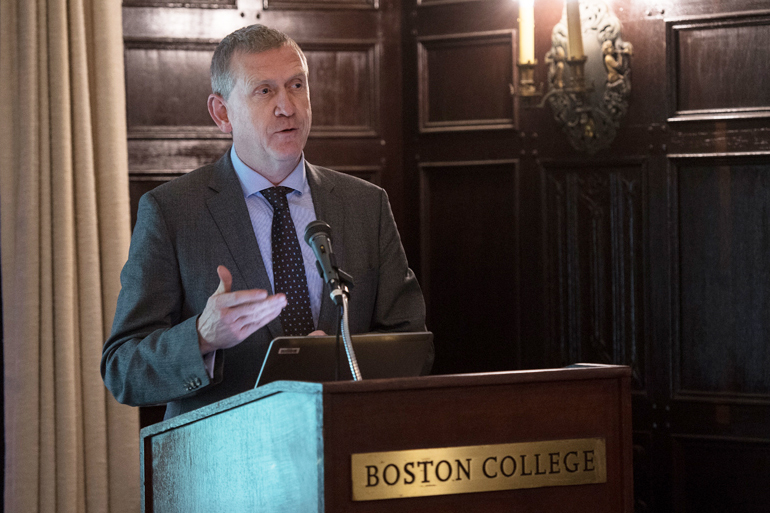What is transnational law? How do we define law in an emerging global world? These are the types of questions that Professor Peer Zumbansen, a leading global law theorist at King’s College in London, Dickson Pool School of Law, spoke about in his talk, “Globalization’s Elusive Search for Justice: Categories, Maps, Interventions.”
The February 16 lecture, sponsored by the Clough Center for the Study of Constitutional Democracy and held at BC Law, focused on defending a critical concept of law’s globalization based on a close analysis of the parallels between “global” and “domestic/local” governance. Zumbansen explored how we might save law from globalization’s “hegemonizing” effect by turning to the study of emerging actors, norms, and processes.
For Zumbansen, justice is a large part of this answer, but determining how justice applies in the law is challenging when faced with not just a pluralistic society but also a pluralistic global world. He noted that many modern-day theories emerged from this struggle, including critical race theory and global constitutional law, and said that taking these theories and applying them to the real world was (and is) critical to answering today’s global legal questions.
This is where transnational law comes in, Zumbansen explained, because it provides the bridge between our domestic experience of law and the “global diffusion of norms and rearrangement of actors and processes.” In answering questions about the nature and purpose of law, transnational law shines a “critical lens” on which to address law’s functionalism. The turning point was the Nuremburg trials, he said, which “set forth a new beginning” in our understanding of global law and its relation to justice.
But the first question to ask is what exactly is transnational law? Is it just the amalgamation of private agreements between corporations and public treaties between nations? Or is it something more?
In Zumbansen’s view, transnational law is more about a process than an answer; it should be approached from the familiar (analogies, frictions, and concerns) as well as from the outside (displacing law by not taking it for granted). To understand the law, we need to understand its foundations, he said, and transnational law asks us to think creatively about these foundations. Does law’s legitimacy come from Parliament? Or also from the G20? Rio+20? Or the Paris Conference? He described transnational law’s three motivating factors as: 1) global problem solving; 2) overarching conceptions of justice; and 3) social ordering forms.
Zumbansen next turned to the relationship between traditional law and modern or transnational law. Traditionally, the situs of law is the State itself. Defining a state is a difficult task, though—is it the historical experience, the endorsed memory of a people, or the normative appreciation of the necessity of the state?
Nevertheless, the foundations of a state can help us in this definition, he said. These foundations include actors, norms, and processes. For a traditional state, the actors would include people and government, norms defined by laws and treaties, and processes that include executive orders and presidential pardons.
Zumbansen contrasted these traditional norms with modern day and transnational law norms. Today, actors include states, corporations, and NGOS; norms include laws, treaties, codes, and accords; and the processes include democracy, problem fixing, and paradigm changes. Transnational law helps to bridge this gap so that law can both reflect and react to modern sociological conditions.
To bring all of this back to the real world, Zumbansen looked at a problem and how transnational law helps to solve it. He offered the current FIFA football scandal concerning migrant workers in Qatari. Transnational law helps us to frame and think critically not necessarily about the right answer to these questions, but how to think critically about approaching the problem—in other words, by asking things like, what law do we apply to these workers? Qatari law? International law? FIFA law? International agreements? Considering all of the variables and differing ideas and theories is the only way to accurately get to the right and just result, he said.
Zumbansen said that the way to this solution begins in law school. Looking at the shifts in law—from concrete forms to experiments; government to governance; from municipal to global; and from enforcement to disclosure—is only possible with a critical transnational legal mind.
Instead of having students take a “transnational law” class, he said, professors should include these issues in basic and core classes. For example, he believes you can’t teach criminal law in today’s world without speaking about 9/11 and the war on terror. You can’t teach corporations without looking at how corporations are expanding in the global world.
As the law becomes more global, he concluded, we need to think critically about including, throughout the curriculum, ideas that transnational law has taught us.


